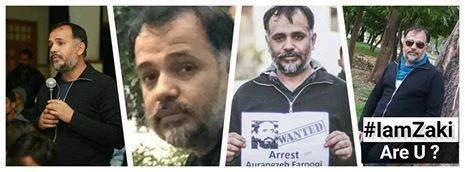(New York, May 10, 2016) – Pakistani authorities should conduct a prompt and impartial investigation into the killing of human rights activist Khurram Zaki and appropriately prosecute those responsible, Human Rights Watch said today. Zaki, 40, had been publicly critical of extremist cleric Abdul Aziz and militant sectarian groups.
On May 7, 2016, four unidentified gunmen opened fire on Zaki at a restaurant in Karachi, killing him and wounding two others. Zaki had been receiving threats and had confided to friends that he was on several militant “hitlists.”
“A thorough and impartial investigation with proper witness protections is absolutely critical to ensure those responsible for Khurram Zaki’s death are brought to justice,” said Brad Adams, Asia director at Human Rights Watch. “It’s appalling that activists who are at the forefront of opposing violence by militant groups should themselves become targets.”
The Hakeemullah group, a relatively unknown faction of the Pakistani Taliban, claimed responsibility for the murder in a phone call to Reuters, saying that Zaki was targeted because of his stance against Abdul Aziz. However, Pakistani authorities and others have expressed skepticism at this claim. On May 9, the police registered a criminal case against Abdul Aziz, Arungzeb Farooqi, a leader of the anti-Shia Ahle-Sunnt-Wal-Jammat (ASWJ), and unidentified gunmen. Abdul Aziz has been acquitted in several criminal cases in the past because witnesses recanted their statements. Similarly, the Pakistan government has failed to hold ASWJ and its affiliate, the militant group Lashkar-e-Jhangvi (LeJ), accountable for attacks on people from the Shia Muslim community.
The authorities have accused Abdul Aziz of abducting Chinese nationals working in Pakistan, inciting supporters to commit violence against state functionaries, targeting security officials, and extending support to the extremist group Islamic State, known as ISIS. ASWJ, previously Sipah-i-Sahaba, which was banned after the September 11, 2001, attacks in the US, is accused of carrying out attacks and inciting violence against members of the Shia community, attacking government and civilian installations, and attacking the Sri Lankan cricket team in Lahore.
Zaki had been leading a public campaign against Abdul Aziz and militant sectarian organizations. He had filed a police complaint against Abdul Aziz for inciting violence against Shia and was a vocal critic of ASWJ and LeJ.
The Pakistani government has failed to take a clear stand against intimidation and violence by militant groups or defend the right to freedom of expression, Human Rights Watch said.
On April 25, Pakistani authorities banned “Among the Believers,” an internationally screened and award-winning documentary about the Red Mosque in Islamabad and the radicalization of students studying in the seminary. They said, “the film projects a negative image of Pakistan in the context of ongoing fight against extremism and terrorism.” The film’s co-director, Muhammad Naqvi, said in a press statement that besides following Abdul Aziz and his Red Mosque network over five years, “the film features the stories of Pakistanis that have never been shared before… Censoring these stories is what really damages the image of Pakistan.”
On April 21, the authorities also banned another documentary film, Besieged in Quetta, about the violence against the Hazara Shia community in Quetta. According to the film’s director, “The [Pakistan film censor] board offered no clear reason for the ban other than the claim that it portrays ‘the negative side of the country.'” In recent years, the LeJ has carried out numerous attacks against the Hazara Shia community, killing hundreds of people.
The censorship of documentaries and critical comment on violence by sectarian groups makes the few people who express their opposition more vulnerable, Human Rights Watch said. In recent years, a campaign of high-profile threats, intimidation, and assassinations by extremists has had a chilling effect on efforts to oppose Pakistan’s discriminatory laws and policies.
“Zaki’s murder highlights the unacceptably dangerous climate that human rights defenders face across Pakistan,” Adams said.
The principal planner of the assassination of prominent rights activist Sabeen Mahmud in April 2015 later said that he killed her because “she was generally promoting liberal, secular values. There were those campaigns of hers, the demonstration outside Lal Masjid [Red Mosque], Pyaar ho jaane do [let there be love] on Valentine’s Day and so on.” Zaki was part of the same demonstrations outside the Red Mosque.
In May 2014, Rashid Rehman, a human rights activist and lawyer, was assassinated in an apparent reprisal for his willingness to represent people charged under Pakistan’s blasphemy law.
Article 12 of the United Nations Declaration on Human Rights Defenders sets out that governments shall take all necessary measures to ensure the protection for human rights defenders against “any violence, threats, retaliation, de facto or de jure adverse discrimination, pressure or any other arbitrary actions” related to their efforts to protect and promote human rights and fundamental freedoms.
“The Pakistani government needs to protect rights activists and promote an environment where they can carry out their work free from threats, attacks and intimidation,” Adams said. “It is crucial for the authorities to stop ignoring militant groups and clamp down on those behind the violence.”
Source:
https://www.hrw.org/news/2016/05/10/pakistan-investigate-killing-rights-activist

